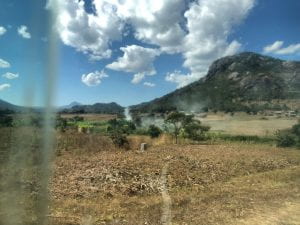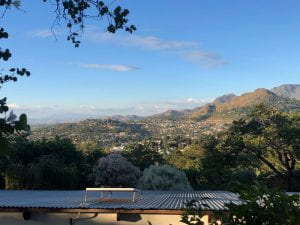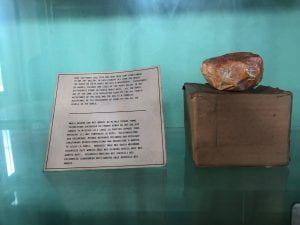After 3 long days of traveling we arrived in Lilongwe, where we were warmly greeted by Mr. Richard. Due to our flight delay from Johannesburg we spent the night in Lilongwe and headed to Blantyre on Thursday morning. On the bus ride I was able to see the beautiful mountains, cows, goats and rest stops with all sorts of snacks being sold. The scenery and general feeling has a resemblance to that of my family’s country, Colombia. It brought a smile to my face, because while I will be so far away from home this summer, I will be comforted by the little things that remind me of my family. On the flight from Johannesburg to Lilongwe I sat next to a professor who told me “Did you know that Malawi is the warm heart of Africa?” I shook my head and smiled and he explained a little further. With the kids waving in the streets and people’s warm smiles, I am slowly starting to understand what it means.

This week, we were mainly preparing and running errands to begin our internships full speed next week. Through this time we were able to begin to get to know the Tanzanian interns, Nana, Betty, Cholo and Joel. They will be living with us at Kabula Lodge, so we will be able to spend quality time together, we have already laughed and learned from each other. I had quite an interesting conversation after breakfast yesterday with Cholo about the “American Dream” and how each speaking respectively of personal experiences in Tanzania and Colombia, people are sometimes so infatuated with the idea of going to the United States that they do not realize life there is not always easy and we have our own socio-economic disparities and inequitable access to healthcare. Coming from an immigrant parents who have worked hard in the United States, I am grateful for the opportunities I have been afforded due to their sacrifice, but I also recognize that there is an issue with the United States being viewed as the ultimate goal, when each country has their own diverse and unique customs and resources. And of course, this may just be my privilege speaking, since I am on the other side of it, but this is something I will push to explore and critically reflect on this summer.

On a lighter note, the view from the lodge in the mornings is breathtaking. The sun shines right above the mountains, with the rays slowly shining through as it rises, making waking up early so much easier. I hope to explore and learn more about Malawi’s flora and fauna while here.
We spent Friday, going to Queen Elizabeth Hospital and the Polytechnic to introduce ourselves. We met Thandie and a couple of other Rice 360 workers. We will be meeting Sara and Aba later on, since they are traveling for the rest of the week. The hospital is big with many hallways and areas so it took us a little while to someone who knew where the office was, and had it not been for the nice man who walked us there, we would have probably gotten lost. So with my lack of sense of direction, finding our way around on our own next week, should be interesting…
Since my last blog where I mentioned our introduction the Human Factors Assessments, Kyla and I have worked on a Usability outline which we are waiting for comments on what to improve from Dr. Acemyan. We mainly used the System Usability Scale (SUS) and the Usefulness, Satisfaction and Ease of Use Questionnaire (USE), as a basis for the questions we designed. The goal is that we will be able to design a guideline for informal usability interviews in a way that will be applicable to several different devices and technologies and be able to be asked in a short 10-15 minute span. I believe we will be able to add and modify our outline once we talk to the nurses and understand a little better what the Rice360 office does in the hospital.
Lastly, we went to the Museum of Malawi today and were able to see a brief history of Malawi from the Stone Age to when they finally became a free republic in 1966. It amazed me that it was so recently! Throughout the museum I had mixed feelings. I loved reading and seeing their traditions, beliefs and typical clothing and jewelry but I had a heavy feeling when seeing the exhibitions on the slave trade and colonization period. These are topics I have learned about in school, but its one thing to read about it and another to actually visit a place where its people have been affected and there are artifacts and demeaning depictions. The sad reality is that we have not gotten as far as it seems, there still continue to be countries today that are not independent or where their citizens are being terrorized and abused by the government. Another of my personal goals, for this summer will be to begin to understand my place in making a sustainable difference in the world through a career in the global health sphere, while not being discouraged by its problems and how daunting it can seem.
